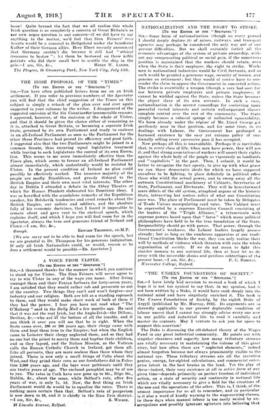A VOICE FROM ULSTER.
ITo THE EDITOR OF THE "SPECTATOR."] Ste,ŌĆöA thousand thanks for the manner in which you continue to stand up for Ulster. The Sinn Feiners will never agree to try to win Ulster in any of the ways you name. After living amongst them and their Fenian forbears for forty-seven years, I am satisfied that they would rather rob and persecute us out of the country. Two things they can't and won't forgiveŌĆöour industry and our religion. Both are felt as a standing reproach to them, and they would make short work of both of them if they had the power. I fear you have not read what "The O'Mahony " said in the Daily Mail a few months ago. He said that it was not the real Irish, but the Anglo-IrishŌĆöthe Dillons, Devlins, &c.ŌĆöwho areqii the liottom of all the trouble, and if you think it over you will see that he is right. When the Scots came over, 200 or 300 years ago, their clergy came with them and kept them true to the Empire; but vhen the English came to Leinster their clergy neglected them, and so they had no one but the priest to marry them and baptize their children, and so they lapsed, and the Italian Mission, as the Vatican calls the Roman Catholic Church in Ireland, got them all. Like all perverts, they are more zealous than those whom they joined. There is now only a small fringe of Celts about the West,and they grind their corn as our forefathers did in Palestine 2,000 years ago, and the boys wear petticoats until they are twelve years of age. The enclosed pamphlet may he of use to you. The rates in Cork have now gone up to 16s., Sligo 16s., Dublin, &c., about the same, while Belfast's rate, after five years of war, is only 7s. 1d. Now, the first thing an Irish Parliament would do would be to equalize the rates. There is nothing more certain than that. Belfast's rate of pauperism is now down to 68, and it is chiefly in the Sinn Fein district.
ŌĆöI am, Sir, &c., S. Wasox.
32 Lincoln Avenue, Belfast. ŌĆó NATIONALIZATION AND THE RIGHT TO STRIKE. (To THE EDITOR OF THE "SPECTATOR.") Sts,ŌĆöSome form of nationalization (though on every ground I should deeply deplore it) of mines, railways, and transport agencies may perhaps be considered the only way out of our present difficulties. But we shall certainly forfeit all the economic advantages of the system of private ownership, without any compensating political or social gain, if the monstrous position is maintained that the workers should retain, even when the State is their employer, the right to strike. Workmen in nationalized industries would be Civil Servants, and as such would be granted a generous wage, security of tenure, and pension on retirement; but they would of course have to surrender the claim to oppose the Government in concerted action. The strike is essentially a weapon (though a very had one) for use between private employers and private employees; it cannot be wielded against the State, unless the State becomes the abject slave of its own servants. In such a case, nationalization is the merest camouflage for conferring upon powerful vested interests and certain well-organized classes complete control over the rest of the community. The State simply becomes a colossal sponge of unlimited squeezability. We have already under the r4gime of Mr. Lloyd George got perilously near to that position, and for some time, in its dealings with Labour, the Government has prolonged a harassed existence by the easy yet ruinous policy of continually selling every successive pass it has occupied.
Now perhaps all this is unavoidable. Perhaps it is inevitable that, in every class of life, when men have power, they will use it, and that strong associations of workers will assert their rights against the whole body of the people as vigorously as landlords and "capitalists " in the past. Then, I submit, it would be better to recognize the fact openly, to give up with what grace we can those democratic ideals for which we have supposed ourselves to be fighting, to place definitely in political office those who wield the (lanai power, and to sweep away all the outworn Constitutional machinery of Cabinets, Secretaries of State, Parliament, and Electorate. They will be henceforward mere debris of the old system, atrophied organs of the historic State, interesting but useless relies of what our Constitution once was. The place of Parliament must be taken by Delegates of Trade Unions manipulating card votes. The Cabinet must be superseded by a supreme Executive Council consisting of the leaders of the "Triple Alliance," a triumvirate with supreme powers based upon that " force" which many political philosophers have held to he the true foundation of the State. Responsibility should go with power. That power, through the Government's weakness, the Labour leaders largely possess already; but as long as the cumbrous apparatus of our traditional Constitution blocks the way, they can only realize their will by methods of violence which threaten with ruin the whole organization of society. If we do not mean to fight this sinister menace to our national life, then at least let us (le away with the miserable shams and perilous subterfuges of the
present hour.ŌĆö! am, Sir, &c., P. E. ROBERTS. Worcester College, Oxford.


































 Previous page
Previous page